What is Maintenance Calorie Calculator
A Maintenance Calorie Calculator is a free tool that calculates the calories you need to consume daily to maintain your current weight.
It calculates your daily calorie needs based on your gender, age, weight, height, and physical activity levels.
By knowing your maintenance calories, you can manage your diet effectively for weight management or other fitness goals.

How to Use Maintenance Calorie Calculator?
Follow these simple steps to calculate the calories you need daily to maintain your weight:
1. Select Gender: Choose your gender, male or female to get gender-specific
results.
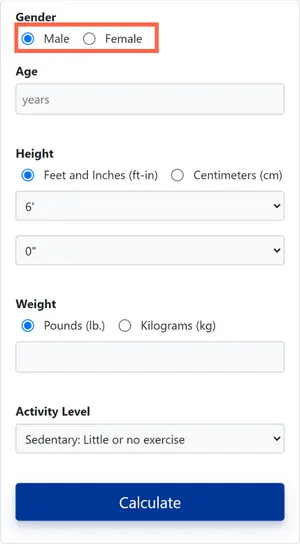
2. Enter Age: Enter your current age in years.
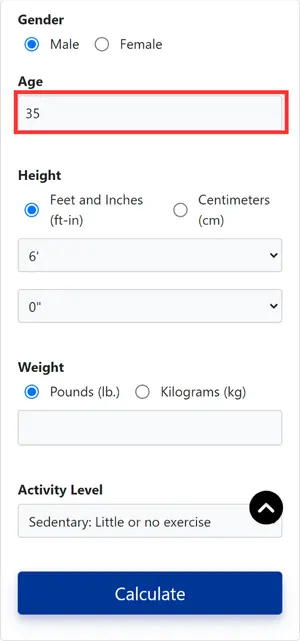
3. Input Height: Select your height using feet and inches or by entering in
centimeters.
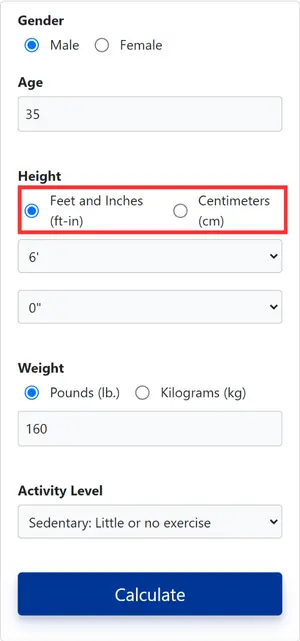
4. Input Weight: Enter your weight in pounds (lb.) or kilograms (kg).
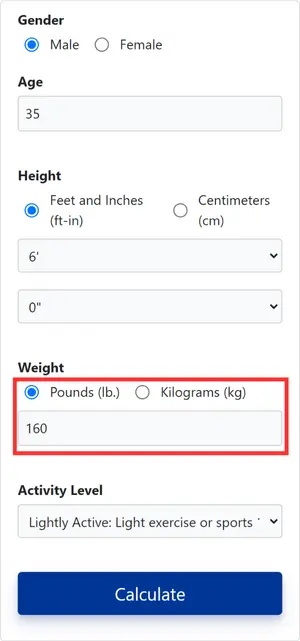
5. Select Activity Level:
- Sedentary: Little to no exercise.
- Lightly Active: Light exercise or sports 1-3 days a week.
- Moderately Active: Moderate exercise or sports 3-5 days a week.
- Very Active: Hard exercise 6-7 days a week.
- Extra Active: Very hard exercise, physical job, or training twice a day.
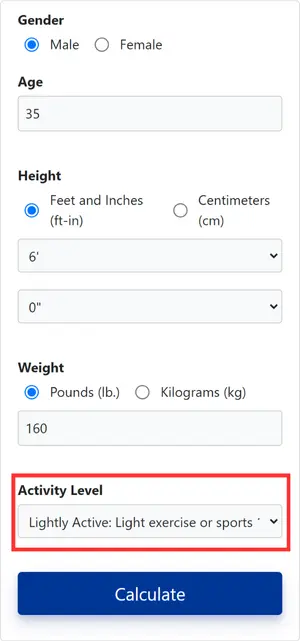
6. Click Calculate: After entering all details, hit the "Calculate" button to get your result instantly.
7. View Results: The results will show the calories needed to maintain your
current weight.
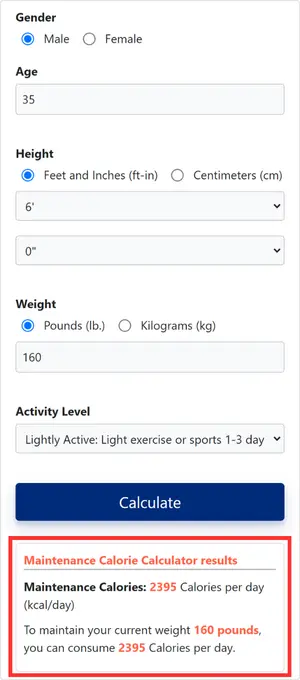
This tool uses the Harris-Benedict equation to determine your basal metabolic rate (BMR), then adjusted based on your activity level to provide a maintenance calorie estimate.
Example of Results
Once you calculate, you’ll get a result like:
- Maintenance Calories: 2395 Calories per day (kcal/day)
- This means you should consume approximately 2395 Calories daily to maintain your weight.
How It Works With Formula
The Maintenance Calorie Calculator estimates the calories required to maintain your current weight using the Revised Harris-Benedict Equation.
This equation calculates your Basal Metabolic Rate (BMR), which is then multiplied by an activity factor based on your physical activity level.
How to Use the Formula
To calculate your maintenance calories:
- Calculate your BMR using the Harris-Benedict equation.
- Multiply your BMR by the appropriate activity factor based on your daily physical activity level.
- The result is your daily calorie intake needed to maintain your current weight.
Revised Harris-Benedict Equation
For Men:
BMR = 88.362 + (13.397 x weight in kg) + (4.799 x height in cm) - (5.677 x age in years)
For Women:
BMR = 447.593 + (9.247 x weight in kg) + (3.098 x height in cm) - (4.330 x age in years)
Activity Factor
After calculating your BMR, the result is multiplied by an activity factor based on your daily activity level:
| Activity Level | Description | Multiplier |
|---|---|---|
| Sedentary | Little or no exercise | 1.2 |
| Lightly Active | Light exercise or sports 1-3 days a week | 1.375 |
| Moderately Active | Moderate exercise or sports 3-5 days a week | 1.55 |
| Very Active | Hard exercise or sports 6-7 days a week | 1.725 |
| Extra Active | Very hard exercise, physical job, or training twice a day | 1.9 |
Example Calculation
Let's calculate the BMR for a 35-year-old man who weighs 80 kg and is 180 cm tall:
BMR = 88.362 + (13.397 x 80) + (4.799 x 180) - (5.677 x 35)
BMR = 1825.25 kcal/day
This means that the man's body requires approximately 1825.25 calories daily to perform basic functions at rest.
Common Food and Calorie Chart
| Food Item | Serving Size | Approx. Calories |
|---|---|---|
| Apple (medium) | 1 fruit | 95 |
| Banana (medium) | 1 fruit | 105 |
| Orange (medium) | 1 fruit | 62 |
| Pear (medium) | 1 fruit | 101 |
| Grapes | 1 cup | 62 |
| Blueberries | 1 cup | 84 |
| Strawberries | 1 cup | 53 |
| Avocado (medium) | 1 fruit | 240 |
| Almonds | 1 ounce (about 23) | 160 |
| Walnuts | 1 ounce (about 14) | 185 |
| Cashews | 1 ounce (about 18) | 157 |
| Peanut Butter | 2 tablespoons | 190 |
| Bread (whole wheat) | 1 slice | 80 |
| Bagel (plain, medium) | 1 bagel | 290 |
| Rice (cooked, white) | 1 cup | 205 |
| Rice (cooked, brown) | 1 cup | 215 |
| Pasta (cooked) | 1 cup | 220 |
| Oatmeal (cooked) | 1 cup | 150 |
| Quinoa (cooked) | 1 cup | 222 |
| Chicken Breast (skinless, cooked) | 3 ounces | 140 |
| Chicken Thigh (cooked) | 1 thigh | 180 |
| Turkey (cooked, lean) | 3 ounces | 135 |
| Beef (ground, 85% lean, cooked) | 3 ounces | 215 |
| Beef (steak, cooked) | 3 ounces | 240 |
| Pork Chop (cooked) | 1 chop | 230 |
| Salmon (cooked) | 3 ounces | 175 |
| Tuna (canned in water) | 3 ounces | 100 |
| Shrimp (cooked) | 3 ounces | 85 |
| Eggs (large, boiled) | 1 egg | 70 |
| Milk (whole) | 1 cup | 150 |
| Milk (skim) | 1 cup | 90 |
| Yogurt (plain, whole milk) | 1 cup | 150 |
| Yogurt (non-fat, plain) | 1 cup | 100 |
| Cheese (cheddar) | 1 ounce | 113 |
| Mozzarella (part-skim) | 1 ounce | 85 |
| Butter | 1 tablespoon | 102 |
| Olive Oil | 1 tablespoon | 119 |
| Mayonnaise | 1 tablespoon | 90 |
| French Fries | 1 small serving | 230 |
| Potato Chips | 1 ounce (about 15 chips) | 150 |
| Popcorn (air-popped) | 1 cup | 30 |
| Pizza (cheese, regular crust) | 1 slice | 285 |
| Hamburger (with bun) | 1 sandwich | 250 |
| Hot Dog (with bun) | 1 sandwich | 250 |
| Pancakes (with syrup) | 2 medium | 350 |
| Waffles (with syrup) | 2 medium | 300 |
| Ice Cream (vanilla) | 1/2 cup | 137 |
| Chocolate (dark, 70-85% cocoa) | 1 ounce | 170 |
| Candy Bar (chocolate with nuts) | 1 bar | 250 |
| Soda (cola) | 1 can (12 oz) | 150 |
| Beer (regular) | 1 can (12 oz) | 150 |
Note: The calorie information provided in this chart is an approximation and may vary based on specific brands, preparation methods, and portion sizes. The values are meant to serve as general guidelines and should not be considered exact. For precise dietary needs and health advice, it is recommended to consult a certified nutritionist or healthcare professional.

How to Maintain Your Weight
Maintaining your weight is a balance between healthy eating habits, regular physical activity, and a positive mindset. Here are some effective strategies to help you achieve long-term weight maintenance:
1. Eat a Balanced Diet
Focus on consuming a variety of foods that provide essential nutrients. Include:
- Fruits and vegetables
- Whole grains
- Lean proteins
- Healthy fats
Restrict processed foods, sugary snacks, and high-calorie beverages.
2. Practice Portion Control
Even healthy foods can cause weight gain if you eat them in large quantities. Use smaller plates, measure serving sizes, and avoid eating directly from large packages.
3. Stay Hydrated
Drinking enough water helps control hunger and helps you to become healthy. Aim for at least 8 glasses of water per day. Or, you can use the daily water intake calculation tool.
4. Exercise Regularly
You can do at least 150 minutes of moderate-intensity aerobic activity per week, combined with strength training exercises. Find activities you enjoy to stay consistent.
5. Monitor Your Weight
Weigh yourself weekly to track changes. It helps you catch small gains early and adjust your habits accordingly.
6. Get Enough Sleep
Lack of sleep can disrupt hormones that regulate appetite, helping to weight gain. Aim for 7-9 hours of quality sleep each night.
7. Manage Stress Level
Chronic stress can motivate emotional eating, do stress management techniques such as meditation, yoga, or deep breathing.
8. Stay Consistent
Weight maintenance is a lifelong commitment. Focus on sustainable habits rather than quick fixes.

What Are Maintenance Calories?
Maintenance calories refer to the number of calories your body needs to consume daily to maintain its current weight — neither gaining nor losing weight. This calorie amount represents the balance between the energy you take in through food and drinks and the energy your body uses for daily activities, bodily functions, and exercise.
How to Calculate Maintenance Calories
Your maintenance calories depend on several factors, including:
- Age
- Gender
- Weight
- Height
- Activity level
- Metabolism
A common method to calculate maintenance calories:
- Finding your Basal Metabolic Rate (BMR) — the number of calories your body burns at rest.
- Multiply your BMR by your activity level to calculate how many calories you burn throughout the day.
Example TDEE Calculation:
- BMR = 1,500 calories (calories burned at rest)
- Activity level = Moderate exercise (eg, 1.55 multiplier)
- TDEE = 1,500 × 1.55 = 2,325 maintenance calories
Best Foods to Maintain Weight
Maintaining a healthy weight is all about balance — eating the right foods in the right amounts while staying active. The best foods to maintain weight are nutrient-dense, satisfying, and support your metabolism without excessive calories.
1. Protein-Rich Foods (Boosts Metabolism & Keeps You Full)
Protein helps preserve muscle mass and keeps you fuller for longer.
- Eggs
- Chicken breast
- Fish (salmon, tuna)
- Greek yogurt
- Lentils and beans
- Tofu
Tip: Include protein in every meal to curb cravings.
2. Whole Grains (Long-Lasting Energy)
Whole grains provide fiber and energy without spiking blood sugar.
- Oats
- Brown rice
- Quinoa
- Whole wheat bread
- Barley
Tip: Swap white rice and bread with whole-grain alternatives.
3. Healthy Fats (Supports Hormones & Satiety)
Healthy fats promote fullness and support overall health.
- Avocados
- Nuts (almonds, walnuts)
- Olive oil
- Chia seeds
- Peanut butter (natural)
Tip: Use portion control with fats — they’re calorie-dense!
4. Fruits and Vegetables (Low-Calorie, High Fiber)
Packed with vitamins, minerals, and fiber, they help you feel full.
- Leafy greens (spinach, kale)
- Berries (blueberries, strawberries)
- Apples
- Carrots
- Broccoli
Tip: Fill half your plate with veggies to naturally eat fewer calories.
5. Dairy or Dairy Alternatives (Calcium & Protein)
Low-fat or plant-based options are great for weight maintenance.
- Greek yogurt
- Skim milk
- Almond milk
- Cottage cheese
Tip: Choose unsweetened versions to avoid extra sugar.
6. Hydrating Foods (Keeps You Full)
Water-rich foods help prevent overeating.
- Cucumbers
- Watermelon
- Oranges
- Tomatoes
Tip: Drink water before meals to naturally reduce portion sizes.
How to Calculate Maintenance Calories Without Exercise (Sedentary Lifestyle)
Calculating your maintenance calories helps you find how many calories you need daily to maintain your current weight without gaining or losing.
Maintenance calories = The number of calories your body needs to maintain your current weight based on your daily activity level.
Since you're not including exercise (sedentary lifestyle), you'll calculate for minimal physical activity (basic daily movements like walking, cooking, or working at a desk).
Step-by-Step Calculation
1. Calculate Your BMR (Basal Metabolic Rate)
Your BMR is the number of calories your body burns at rest to maintain basic functions like breathing, digestion, and circulation.
For Women:
For Men:
Example Calculation:
Female:
- Age: 30
- Weight: 70 kg
- Height: 165 cm
BMR = 700 + 1031.25 − 150 − 161
BMR = 1420.25 calories/day
2. Add Activity Factor (Sedentary Lifestyle)
Now, multiply your BMR by 1.2 (sedentary activity level).
This is the estimated number of calories you need to maintain your current weight without exercise.

Frequently Asked Questions (FAQs):
What are maintenance calories?
Maintenance calories are the energy you need to consume daily to maintain your current weight without losing or gaining.
Can I use this calculator to lose weight?
Yes. To lose weight, you need to consume lesser calories than your maintenance calories, making a calorie deficit.
How accurate is the maintenance calorie calculator?
The results are estimates and vary by 100-300 calories.
Can I use this calculator to gain weight?
Yes, consuming more than your maintenance calories helps to gain weight over time.
What factors influence calorie needs?
Age, gender, weight, height, and activity level influence your calorie needs.
Is this calculator suitable for athletes?
Athletes have different calorie needs, especially if they have muscle mass or intense training schedules.
Does the calculator work for children?
This tool is designed for healthy adults. Children's needs vary, and a pediatrician's advice should be taken.
What should I do if I want to change my weight?
To lose weight, decrease a calorie intake. To gain weight, increase your calorie intake.
Can I maintain weight while eating junk food?
Technically yes, but it is not recommended because it affects overall health.
How often should I recalculate my maintenance calories?
Recalculate if your weight, activity level, or goals change.
Does physical activity affect maintenance calories?
Yes, more physical activity increases the calories you need to maintain your weight.
What are good sources of calories for weight maintenance?
Nutrient-dense foods like vegetables, lean proteins, whole grains, and healthy fats are good for weight maintenance.
How does stress impact calorie needs?
Stress affects your metabolism and eating habits, which increases your calorie needs.
Can I still gain weight even if I eat the exact number of calories to maintain?
If you overestimate your activity level or underestimate your calorie intake, weight gain occurs.
Should I focus on calorie intake only for weight maintenance?
Both calorie intake and the quality of food matter for long-term weight maintenance and overall health.
Is this calculator safe for pregnant or breastfeeding women?
Pregnant or breastfeeding women should consult a healthcare provider for nutrition advice.
How do age and metabolism impact my calorie needs?
Your metabolism slows down as you age, and lower calorie needs.
Can medical conditions affect the results?
Certain medical conditions, like thyroid disorders, can affect metabolism and calorie needs.
Is sleep important for weight maintenance?
Yes, enough sleep is necessary for regulating hormones that control appetite and metabolism.
Can the calculator be used internationally?
You can switch between metric (kg/cm) and imperial (lb./feet) units to suit your preferences.
Is the Maintenance Calorie Calculator free to use?
Yes, the Maintenance Calorie Calculator is completely free to use.
References:
- Wikipedia contributors. (2024, October 6). Basal metabolic rate. Wikipedia. https://en.wikipedia.org/wiki/Basal_metabolic_rate
- Wikipedia contributors. (2024, July 13). Harris-Benedict equation. Wikipedia. https://en.wikipedia.org/wiki/Harris%E2%80%93Benedict_equation
- Definition of nutrient-dense food - NCI Dictionary of Cancer Terms. (n.d.). Cancer.gov. https://www.cancer.gov/publications/dictionaries/cancer-terms/def/nutrient-dense-food
- Department of Health & Human Services. (n.d.). Metabolism. Better Health Channel. https://www.betterhealth.vic.gov.au/health/conditionsandtreatments/metabolism